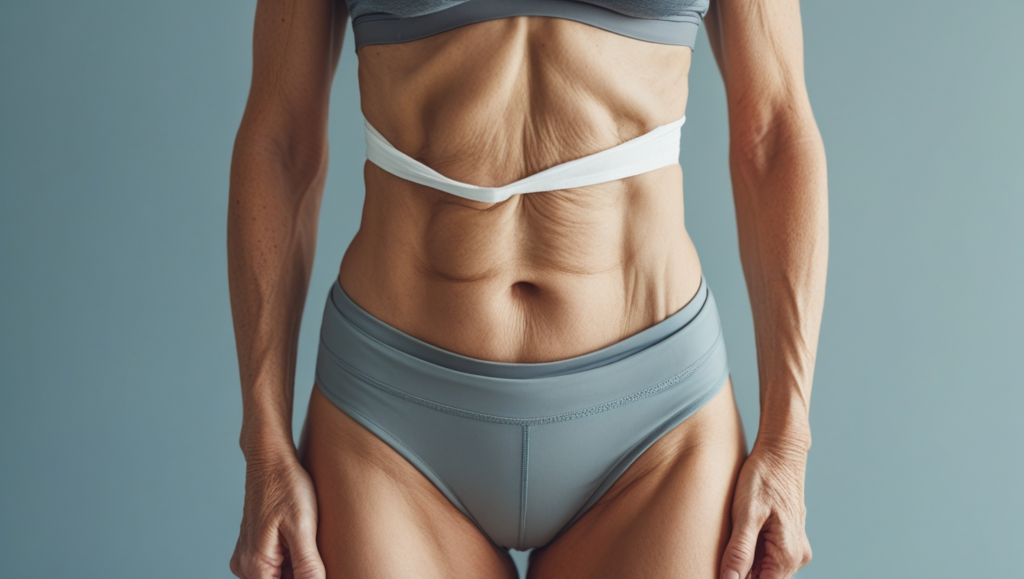When I lost weight, I made sure to lift weights and eat lots of protein to keep my skin tight. Staying hydrated and losing weight slowly also helped me avoid loose skin!
how to prevent loose skin during weight loss, slowly, do strength training, and eat protein-rich foods. Staying hydrated and using moisturizer can also help keep skin firm.
Stay tuned with us! We’ll be sharing the best tips on how to prevent loose skin during weight loss—from strength training to nutrition and skincare. Don’t miss out!
How Does Protein Help In Tightening Skin While Losing Weight?
Protein plays a crucial role in keeping skin firm during weight loss. It helps build and repair muscles, which can fill out loose skin and make it look tighter. Additionally, protein supports collagen and elastin production, two key components that maintain skin elasticity.
When you eat enough protein, it prevents muscle loss and helps your skin adjust as you lose fat. Good protein sources include lean meats, fish, eggs, dairy, beans, and nuts. Adding protein to every meal ensures your skin stays strong and healthy as you shed pounds.
Can Hydration Reduce Loose Skin When Losing Weight?
Yes, staying hydrated is essential for maintaining skin elasticity. When your body is well-hydrated, your skin remains plump and more capable of bouncing back as you lose weight. Water also aids in collagen production, which helps tighten the skin. Drinking at least 8–10 glasses of water a day can improve skin texture and overall health.

Additionally, eating water-rich foods like cucumbers, watermelon, and oranges provides extra hydration. Keeping your skin moisturized from the inside out can significantly reduce sagging and dryness.
What Are The Best Skincare Tips To Maintain Skin Elasticity?
Here are some simple and effective skincare tips to maintain skin elasticity:
Stay Hydrated
Drinking enough water is one of the easiest ways to keep your skin elastic and healthy. When your body is dehydrated, your skin becomes dry, making it less able to stretch and bounce back. Aim for 8–10 glasses of water per day to keep your skin plump and moisturized. Eating water-rich foods like cucumbers, watermelon, and oranges also helps.
Eat Skin-Friendly Foods
Your diet plays a big role in skin health. To keep your skin firm and elastic, eat foods rich in:
- Collagen – Found in bone broth, fish, and chicken, it helps skin stay firm.
- Vitamin C – Oranges, bell peppers, and strawberries help your body produce more collagen.
- Healthy Fats – Nuts, avocados, and olive oil keep your skin soft and flexible.
- Protein – Chicken, eggs, beans, and tofu help build strong, healthy skin.
Use a Moisturizer Daily
Keeping your skin moisturized prevents dryness and improves elasticity. Use a moisturizer with hyaluronic acid, aloe vera, or shea butter to keep your skin soft and hydrated. Apply it right after showering to lock in moisture.
Massage Your Skin
Massaging your skin improves blood flow, which helps deliver nutrients that keep it firm. You can use oils like coconut oil, almond oil, or olive oil to gently massage your skin. Doing this daily can boost collagen production and improve skin elasticity over time.
Protect Your Skin from the Sun
Too much sun exposure damages collagen and makes skin lose its elasticity. Always wear sunscreen (SPF 30 or higher) when going outside, even on cloudy days. Wearing hats and covering your skin with light clothing also helps prevent sun damage.
Exfoliate Regularly
Exfoliating helps remove dead skin cells and encourages new skin growth. Use a gentle scrub or a dry brush once or twice a week to improve blood circulation and skin renewal. This helps keep your skin smooth, firm, and fresh.
Take Collagen Supplements
Collagen supplements can help improve skin elasticity, especially if you’re losing weight. Taking collagen powder or capsules along with Vitamin C can boost your body’s natural collagen production. It may take a few months to see noticeable results, but it can make a difference.
Avoid Smoking and Too Much Alcohol
Smoking and alcohol weaken the skin and reduce collagen production, making the skin sag faster. Avoiding these habits can help keep your skin firm and youthful for longer.
Does Losing Weight Slowly Prevent Loose Skin?
Losing weight at a slow and steady pace can help prevent loose skin. Rapid weight loss doesn’t give the skin enough time to adjust, making it more likely to sag. Ideally, losing 1–2 pounds per week allows your skin to shrink gradually along with fat loss. This controlled process helps preserve skin elasticity and minimizes excessive stretching.

Strength training and a balanced diet also support firmer skin by promoting muscle growth and collagen production. Patience is key—rushing the weight loss process can lead to more loose skin issues in the long run.
What Foods Help Keep Skin Firm During Weight Loss?
Eating the right foods can make a big difference in skin firmness. Protein-rich foods like chicken, fish, eggs, and tofu help build muscle and maintain skin structure. Vitamin C-rich foods such as oranges, strawberries, and bell peppers boost collagen production, keeping skin tight.
Healthy fats from nuts, avocados, and olive oil improve skin elasticity and prevent dryness. Leafy greens provide antioxidants that protect the skin from damage and aging. A balanced diet with these nutrient-rich foods supports firm, healthy skin as you lose weight.
Does Age Affect How Skin Reacts To Weight Loss?
Here’s a simple breakdown of how age affects skin during weight loss and what you can do to keep it firm.
Younger Skin (Under 30)
If you’re in your teens or 20s, your skin has plenty of collagen and elastin, which keep it firm and stretchy. When you lose weight at this age, your skin is more likely to tighten naturally. However, if you lose weight too fast, even young skin can struggle to keep up, leading to some looseness. Losing weight slowly and staying hydrated helps keep the skin firm.
Middle Age (30s to 50s)
As you enter your 30s and 40s, your body produces less collagen and elastin, making the skin less flexible. This means that after weight loss, your skin may take longer to shrink back. If you have been overweight for many years, your skin may have stretched too much, making it harder to tighten. Strength training, eating protein-rich foods, and using collagen supplements can help improve skin elasticity at this stage.
Older Skin (50 and Above)
After 50, the skin becomes much thinner and loses a lot of its natural elasticity. It also loses moisture and fat, which makes it more prone to sagging after weight loss. People in this age group may notice more loose skin, especially if they lose a significant amount of weight. While skincare, hydration, and nutrition can help, some loose skin may remain permanent. In extreme cases, medical treatments like skin-tightening procedures or surgery may be needed to remove excess skin.
Why Does Skin Lose Elasticity with Age?
- Lower Collagen Production: Collagen is the protein that keeps skin firm. As we age, our body makes less of it.
- Weaker Elastin: Elastin helps the skin stretch and return to its shape. Over time, it weakens, making the skin looser.
- Slower Cell Repair: The skin takes longer to heal and regenerate, so it doesn’t bounce back as quickly.
- Less Hydration: Older skin holds less water, making it dry and less elastic.
How to Keep Skin Firm at Any Age?
- Lose Weight Slowly – Losing 1–2 pounds per week gives your skin time to adjust.
- Eat a High-Protein Diet – Foods like chicken, fish, eggs, and nuts help build collagen.
- Drink Plenty of Water – Hydration keeps the skin plump and elastic.
- Moisturize Daily – Use hyaluronic acid or shea butter to keep skin soft and healthy.
- Exercise Regularly – Strength training helps replace fat with muscle, reducing sagging skin.
- Take Collagen Supplements – They can improve skin elasticity, especially when paired with Vitamin C.
- Protect Your Skin from the Sun – Too much sun damages collagen and speeds up skin aging.
Can Collagen Supplements Help With Loose Skin?
Collagen supplements can support skin elasticity and may help reduce loose skin. Collagen is a protein that strengthens the skin, keeping it firm and youthful. Taking collagen with Vitamin C enhances its absorption and effectiveness. While supplements can be helpful, results take time, and it may take several months to see noticeable changes.

Natural sources of collagen, such as bone broth, fish, and eggs, also contribute to skin health. However, relying solely on supplements won’t be enough—combining them with strength training and a nutrient-rich diet provides the best results.
How Much Weight Loss Causes Loose Skin?
The amount of weight loss that leads to loose skin varies from person to person. Factors like age, skin elasticity, and the speed of weight loss all play a role. Generally, losing more than 50 pounds increases the risk of excess skin, especially if the weight is lost rapidly.
Younger skin tends to shrink back better, while older skin may not recover as easily. Gradual weight loss, along with strength training and proper nutrition, can help minimize sagging. In extreme cases, surgery may be needed to remove excess skin after significant weight loss.
FAQs:
How do you keep skin tight while losing weight?
Lose weight slowly, about 1–2 pounds per week, so your skin has time to adjust.
Do strength training, eat protein-rich foods, stay hydrated, and moisturize daily to keep skin firm.
Will losing 50 pounds cause loose skin?
It depends on your age, skin elasticity, and how fast you lose weight.
Losing weight slowly and building muscle can help reduce loose skin after a 50-pound loss.
Can you lose 100 lbs without loose skin?
Losing 100 pounds often leads to some loose skin, especially if done quickly.
Strength training, hydration, and collagen support can help, but surgery may be needed in extreme cases.
Can loose skin tighten over time after weight loss?
Yes, skin can tighten slowly, but it depends on age, collagen levels, and weight lost.
Staying hydrated, eating protein, and doing strength training can help improve skin elasticity.
Does exercise help tighten loose skin?
Yes, strength training builds muscle, which can fill in loose skin and make it look firmer.
Exercises like weight lifting, squats, and push-ups help improve skin tightness over time.
Conclusion
Learning how to prevent loose skin during weight loss is key to achieving a firm and toned body. The best way to keep skin tight is by losing weight slowly, building muscle through strength training, eating protein-rich foods, and staying hydrated. Taking care of your skin with moisturizers, collagen support, and sun protection also helps maintain elasticity. While some loose skin is natural after major weight loss, following these steps can reduce sagging and improve skin firmness. With patience and the right approach, you can support your skin’s health while reaching your weight loss goals!












Discussion about this post